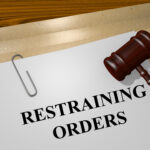Facing a Restraining Order in Massachusetts? Don’t Let It Ruin Your Life—Fight Back with Attorney Patrick Donovan!
A Massachusetts restraining order attorney can help you navigate the serious, long-lasting consequences of a restraining order, including losing your right to see your children, eviction from your home, and damage to your reputation and career. Even if it’s a civil order, it can still affect your criminal record and future opportunities. You need an experienced attorney to challenge false accusations and fight to clear your name.

Attorney Patrick Donovan, a former prosecutor, understands the impact of restraining orders and knows how to effectively fight them in court. He will gather evidence, cross-examine witnesses, and build a powerful case to protect your rights and reputation.
✅ Free, confidential consultation – No risk, no obligation
✅ Former Prosecutor – Knows how to challenge false allegations
✅ Aggressive representation to get the restraining order dismissed
✅ Protect your rights, reputation, and future
🚨 Don’t wait—fight your restraining order today! Call (617) 479-1800 or request your FREE consultation now!
Table of Contents
What is a Restraining Order?
Abuse prevention orders are protective orders issued by a judge. They are found in MGL 209A. Restraining orders are civil orders with criminal penalties.
Who Can Get a 209a Order?
Any person in a “substantive relationship” (dating, family, or roommate) can apply for a restraining order in Massachusetts. Superior Court, Probate Court, and District Court in Massachusetts have jurisdiction to issue these orders.
How to Get a Restraining Order in Massachusetts
An ex parte hearing is the first step in the Massachusetts restraining order process. This ex-parte hearing is where one side can get a temporary 209a order. At this hearing, the person seeking the order (the plaintiff) must fill out an affidavit. This must say why they think they need the 209a order. Finally, if the judge believes the plaintiff can show a reasonable fear of harm the order issues.
Two Party Hearing
The two-party hearing is the second step. The two-party hearing is held ten days after the ex parte hearing. The plaintiff goes first at the extension hearing. Usually, the plaintiff will tell the judge why the order is needed. If the plaintiff has an attorney, the attorney may question the plaintiff.
After the plaintiff testifies, the defendant has a right to ask questions. This is called cross-examination. The plaintiff can, if they want, call witnesses after the cross-examination. The defendant can then cross-examine the witnesses. The defendant may testify after the plaintiff presents all of their evidence. This is entirely the defendant’s decision. If the defendant chooses to testify, the plaintiff has the right to cross-examination. Also, the defendant can offer any witness they like.

The last part of the two-party hearing is closing arguments. Both sides can make a closing argument. The plaintiff will argue in support of the order, and the defendant will argue why the plaintiff does not need a Massachusetts restraining order.
The judge, after hearing all of the evidence and argument, has to decide if the order should be issued. The judge must use the preponderance of evidence standard. Then, the judge must determine whether the plaintiff has shown a reasonable fear of physical harm. If the plaintiff does the restraining order issues. Then, the judge cannot issue the order if the plaintiff does not show a reasonable fear of harm. Finally, the judge may issue the order for up to one year.
Extension Hearing
After one year, there is another extension hearing. Again, both sides can present an argument. There, the plaintiff must show a continued need for the protection. Then, the judge must determine if a reasonable person would still be in fear of the defendant. Finally, if the judge extends the order, he can make it permanent or for a certain period of time.
Restraining Order Consequences
209a orders have many consequences. They can either be a no-contact order (otherwise known as a stay-away) or a no-abuse order. A no-contact order means that the defendant must stay away and have no contact with the plaintiff, stay a certain distance away from the plaintiff, and may even force someone to leave their own house. A judge can order the person paying the mortgage or rent to leave. Also, a no-contact order forbids the defendant from calling, emailing, texting, or communicating with the plaintiff.
A no-abuse order does not include a stay-away order. It allows the parties to be near each other. A no-abuse order forbids the defendant from abusing the plaintiff. Any abuse by the defendant will result in a criminal charge.
Any 209a order in Massachusetts requires gun owners not to possess any guns. Therefore, anyone who owns a gun must turn it in to the police, or to a licensed gun owner, while the order is active. Also, anyone who violates the order is subject to immediate arrest. They also face up to two and a half years in the House of Correction.
Restraining Order MA Penalties
The consequences for violating a 209A order in Massachusetts are harsh. Those found guilty can be sentenced to a maximum of two years in the House of Correction. Moreover, additional penalties may involve obligatory participation in an approved program for individuals involved in domestic violence, probation, monetary fines, and associated fees.
Living with a Restraining Order
Once issued, it must be strictly adhered to. Complying with all the stipulations outlined in the order is crucial. For instance, if the order explicitly prohibits any form of communication, it is imperative to refrain from making any contact whatsoever. Furthermore, it is important to note that violations of can have significant implications for both divorce proceedings and child custody cases.
Massachusetts Restraining Order Attorney
Restraining Orders Boston Criminal Defense Attorney Patrick Donovan is an experienced criminal defense attorney who aggressively represents the accused against charges.
